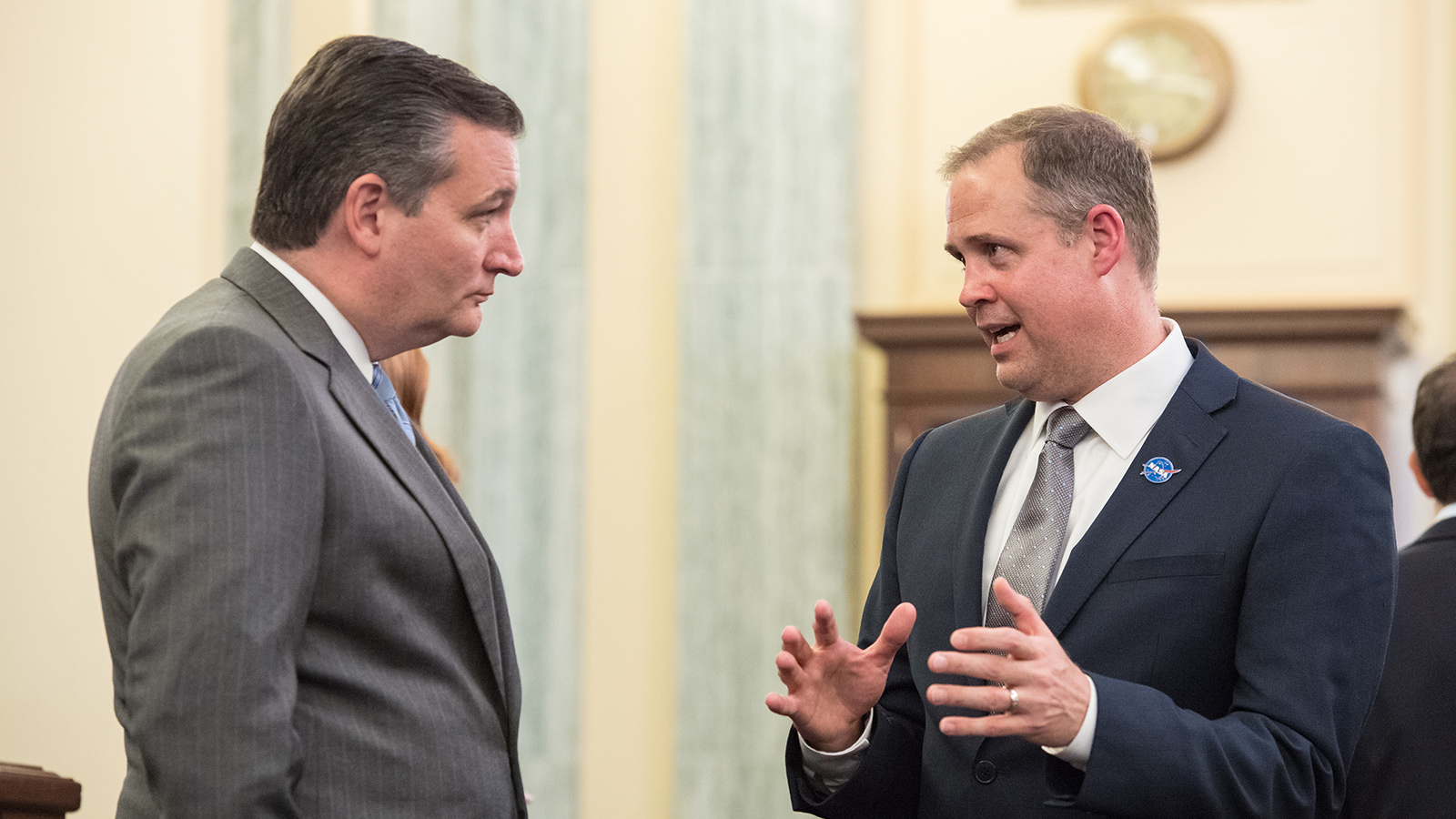
Stay Up to Date
Submit your email address to receive the latest industry and Aerospace America news.

Exchange with Sen. Ted Cruz, R-Texas, comes as NASA seeks revenue to cover exploration goals
NASA Administrator Jim Bridenstine, who is looking for innovative ways to fund the agency’s goals of landing Americans on the moon and Mars, expressed reservations about the idea of generating revenue through space station experiments and merchandising the agency’s logo on T-shirts and other products.
Bridenstine said in a Senate hearing Wednesday that NASA is “doing a lot more than we ever did in the 1960s and we are doing it with a budget that is a lot smaller.”
He began with a plug for reusable launch vehicles and spacecraft as a cost saving measure for getting “back and forth” between Earth and the moon.
“We have seen what happens with reusable rockets: the cost goes down and the access to space goes up,” Bridenstine told the space subcommittee of the Senate Commerce, Science and Transportation Committee. “We want tugs that go from Earth orbit to lunar orbit to be reusable.”
Subcommittee Chairman Sen. Ted Cruz, R-Texas, raised the possibility of NASA receiving funds from the private sector, including through “compensation off the sale of the agency’s logo” on T-shirts and other products.
“A chunk of that ought to go to NASA and actually help fund getting to the moon and getting to Mars,” said Cruz, whose state is home to NASA’s Johnson Space Center.
To “seek new sources of revenue,” Bridenstine in August created a new advisory committee within the NASA Advisory Council to investigate options including corporate sponsorships of astronauts and selling naming rights for spacecraft.
Bridenstine, nevertheless, expressed reservations about the T-shirt idea. Seeing people wear NASA logos is “a source of pride,” Bridenstine said, and he suggested that if NASA were to add a fee for the right to display the logo, that could “quell” Target and other retailers from selling T-shirts with the logo.
“I don’t know what the right answer here is,” Bridenstine said.
The advisory committee also is examining the option of increasing the compensation NASA receives for hosting experiments on the International Space Station.
Experiments conducted by NASA astronauts for companies including Goodyear tire company and drug maker Merck, Cruz said, are potentially profitable enough for the agency “to alter current research agreements” and seek “fair compensation.”
Bridenstine responded “we are looking at it right now,” adding a caveat that NASA did not want to discourage private sector interest in experiments by raising prices for experiments on the station and “charging for something they can get for free in a different country.” Doing so, he said, would risk driving companies to contract with China, which aims in the 2020s to launch pieces to assemble its own space station in low Earth orbit as a venue to conduct experiments.
The China Manned Space Agency set a deadline of September 30 for groups to apply to have experiments launched to this space station once it is completed.
Cruz said “we cannot cede low Earth orbit to China, or any other nation,” and maintaining a permanent American presence in low Earth “may require the presence of a government station.”
The Trump administration budget proposal for 2019 calls for the U.S. government to end funding for the International Space Station in fiscal 2024. Bridenstine agreed with Cruz that the U.S. must maintain a presence in low Earth orbit and clarified to lawmakers “there is no plan to de-orbit the International Space Station. We want to commercialize it.”
About Tom Risen
As our staff reporter from 2017-2018, Tom covered breaking news and wrote features. He has reported for U.S. News & World Report, Slate and Atlantic Media.
Related Posts
Stay Up to Date
Submit your email address to receive the latest industry and Aerospace America news.



